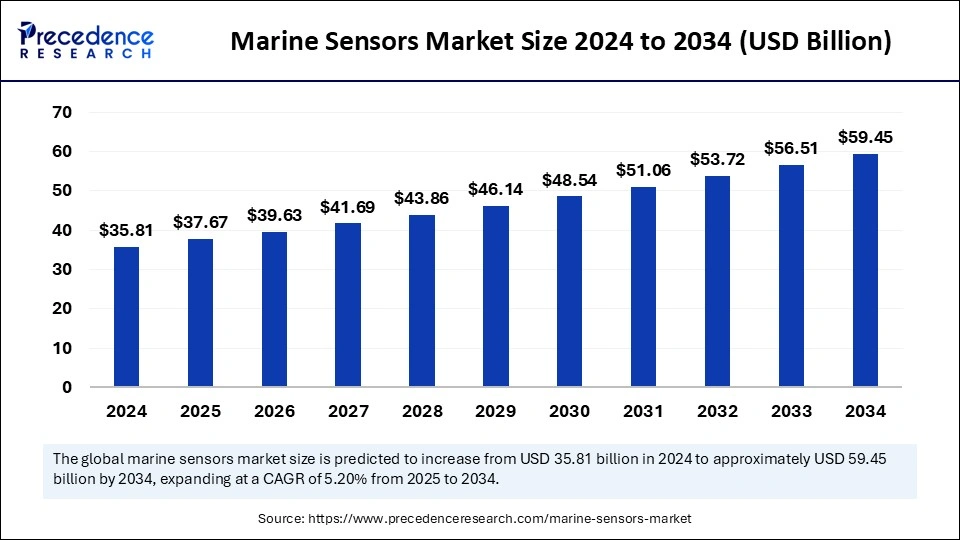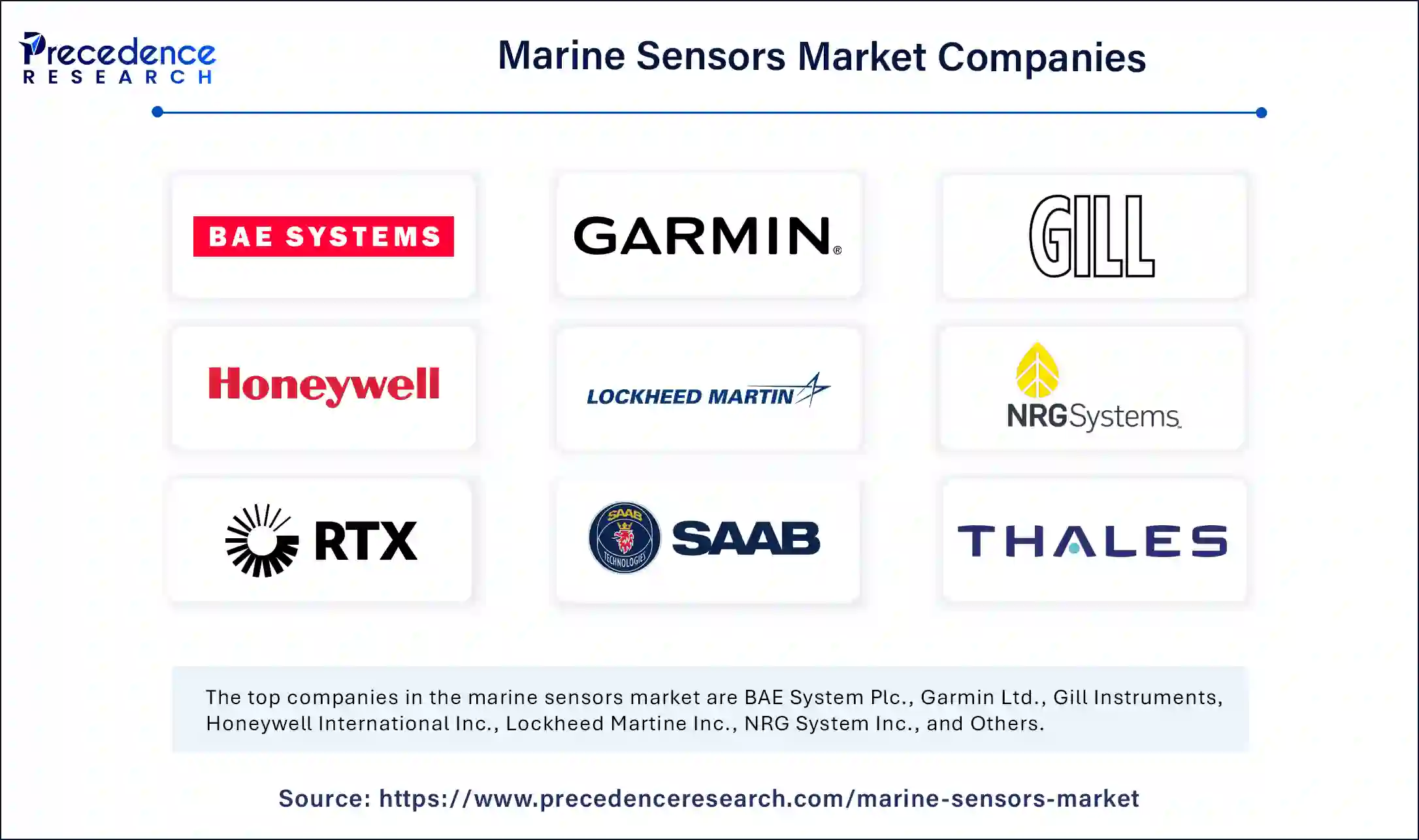The global marine sensors market size was valued at USD 35.81 billion in 2024 and is expected to attain around USD 59.45 billion by 2034, growing at a CAGR of 5.20% from 2025 to 2034.

Get a Free Sample Copy of the Report@ https://www.precedenceresearch.com/sample/5775
Marine Sensors Market Key Takeaways
-
Asia Pacific captured the largest portion of the marine sensors market in 2024, making up 46% of total revenue.
-
The North American region is set to expand at the quickest rate in the coming years.
-
Flow and level sensors were the most widely used type in 2024.
-
Acoustic sensors are positioned for strong growth during the forecast period.
-
Military defense platforms led the market in terms of usage in 2024.
-
The commercial sector is projected to record the highest growth rate.
-
Applications in surveillance and monitoring took the lead in 2024.
-
Communication and navigation applications are projected to grow rapidly going forward.
The Rise of Intelligent Marine Sensors: AI’s Impact on Ocean Technology
Artificial Intelligence is playing a transformative role in the marine sensors market by enhancing the accuracy, efficiency, and real-time decision-making capabilities of marine operations. AI-powered algorithms enable smart data processing from sensors, allowing for predictive maintenance, anomaly detection, and advanced environmental monitoring.
These intelligent systems can analyze vast volumes of oceanographic data, such as salinity, temperature, flow, and acoustic signals, much faster than traditional methods. This not only improves the performance of marine sensors but also supports automated systems for surveillance, underwater navigation, and defense applications.
Furthermore, the integration of AI with marine sensors is driving innovation in autonomous underwater vehicles (AUVs) and unmanned surface vehicles (USVs), allowing them to operate with greater autonomy in complex marine environments. AI facilitates adaptive learning and behavioral modeling, enabling these systems to respond to dynamic conditions like changing currents, obstacles, or threats.
As maritime industries—such as oil & gas, naval defense, and environmental research—shift towards smarter, more sustainable operations, AI is emerging as a critical enabler of intelligent, responsive, and data-driven marine sensing solutions.
Marine Sensors Market Scope
| Report Coverage | Details |
| Market Size by 2034 | USD 59.45 Billion |
| Market Size in 2025 | USD 37.67 Billion |
| Market Size in 2024 | USD 35.81 Billion |
| Market Growth Rate from 2025 to 2034 | CAGR of 5.20% |
| Dominated Region | Asia Pacific |
| Fastest Growing Market | North America |
| Base Year | 2024 |
| Forecast Period | 2025 to 2034 |
| Segments Covered | Type, Platform, Application, and Regions. |
| Regions Covered | North America, Europe, Asia-Pacific, Latin America and Middle East & Africa |
Marine Sensors Market Dynamics
Market Drivers
Key factors driving the market include rising maritime security concerns, an increase in naval defense investments, and the growing use of autonomous marine vehicles. Technological advancements, such as enhanced sensor accuracy and real-time data transmission, are further propelling adoption across sectors.
Opportunities
Significant growth opportunities lie in the development of smart ports, expansion of offshore energy exploration, and environmental monitoring. The adoption of AI-powered marine systems and the increasing use of unmanned underwater vehicles also present new avenues for market expansion.
Challenges
Despite promising growth, the market faces hurdles such as high installation costs, harsh underwater environmental conditions, and limited interoperability between different sensor systems. Maintenance and long-term durability also remain concerns in extreme marine settings.
Regional Insights
Asia Pacific leads the marine sensors market, driven by strong naval expansion and oceanographic research initiatives in countries like China and India. North America is expected to grow at the fastest rate, fueled by technological innovation and defense modernization. Europe also holds a significant share, especially in commercial maritime operations and environmental research.
Marine Sensors Market Companies

- BAE System Plc. (U.K.)
- Garmin Ltd. (U.S.)
- Gill Instruments (India)
- Honeywell International Inc. (U.S.)
- Lockheed Martine Inc. (U.S.)
- NRG System Inc. (U.S.)
- Raytheon Company (U.S.)
- SAAB AB (Sweden)
- Thales Group (France)
Marine Sensors Market Recent Developments
- In March 2024, a pioneer in research-quality conductivity-temperature sensors for mobile marine platforms, Neil Brown Ocean Sensors, Inc., launched its latest innovation ahead of Oceanology International 2024 in London. The aim behind this launch was to redefine underwater data collection and address an increasing demand for smaller, more capable unmanned underwater vehicles (UUVs) in various industries.
- In December 2024, Vaisala launched a robust ultrasonic wind sensor for optimized maritime performance and wind turbines. This sensor is designed to withstand the unique challenges and wide range of conditions in both maritime environments and wind farms.
Segments Covered in the Report
By Type
- Acoustic Sensors
- Magnetic Sensors
- Sonars
- Pressure Sensors
- Temperature Sensors
- Flow and Level Sensors
- Others (Magnetometer, Infrared Sensors, Seismic Sensors)
By Platform
- Military and Defense
- Commercial
By Application
- Intelligence and Reconnaissance
- Communication and Navigation
- Electronic Warfare
- Target Recognition
- Surveillance and Monitoring
- Others (Combat Operations and Command and Control)
By Region
- North America
- Europe
- Asia Pacific
- Latin America
- Middle East and Africa
Also Read: Aviation Connector Market
Ready for more? Dive into the full experience on our website@ https://www.precedenceresearch.com/
- Perishable Prepared Food Market Size to Attain USD 157.77 Bn by 2034 - April 24, 2025
- Fabric Filter Market Size to Attain USD 7.50 Billion by 2034 - April 24, 2025
- Pilot Training Market Size to Attain USD 31.38 Bn by 2034 - April 24, 2025
